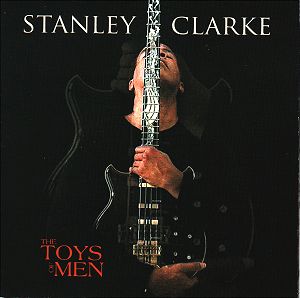1. The Toys of Men
2. Come On
3. Jerusalem
4. Back in the Woods
5. All Over Again
6. Hmm Hmm
7. Bad Asses
8. Game
9. La Cancion De Sofia
10. El Bajo Negro
11. Broski
12. Chataeuvallon 1972
13. Bass Folk Song No. 6.
Stanley Clarke - Electric bass, acoustic bass,
spoken word, Victor Bailey model acoustic
bass guitar, programming, tenor bass, prepared
tuned electric bass, piccolo bass
Ruslan Sirota - Keyboards, acoustic piano,
programming, Fender Rhodes
Mads Tolling - Violin
Esperanza Spalding - Vocals
Jef Lee Johnson - Guitar
Ronald Bruner Jr. - Drums
Tomer Shtein - Acoustic guitar
Michael Landau - Acoustic guitar, electric
guitar
Phil Davis - Keyboards
Paulinho Da Costa - Percussion
Whatever
happened to Stanley Clarke? I'm old enough
to remember the impact he made when he first
appeared on the jazz scene, particularly when
he was a vital ingredient in Chick Corea's
Return to Forever group. Yet we haven't had
a solo album from him for several years and
his name seems to have dropped out of view.
Apparently he has been devoting much of his
time to writing music for films. However,
this album should put him right back in the
limelight - not only as a virtuoso bassist
but also as a composer.
The
CD opens with the remarkable six-part title-track:
a suite which expresses Clarke's attitude
to war. He says: "When there are disagreements
and disputes between countries, people always
go back to their toys and how they can use
them to intimidate their adversaries". His
suite passes through episodes of violence
and chaos (starting with an ominous spoken
countdown from Clarke) into a saner region
of peace and reconciliation.
The
other tracks on the album reveal Stanley's
breadth as both player and composer. Come
On is very much in the jazz-rock mould
of Return to Forever. The peace-and-love message
continues in All Over Again, which
sounds as if it might be one of Stevie Wonder's
pleas for brotherly love. Bad Asses
features the finger-slapping bass guitar style
which Clarke pioneered, with Ronald Bruner
Jr. adding muscular drums which make this
track a very sophisticated version of drum
'n' bass. Chateauvallon 1972 is dedicated
to drummer Tony Williams, so it naturally
features some more powerful drumming from
Bruner, although its repetitive riff gets
rather tiresome after several minutes.
Yet
the album is not all sound and fury. Jerusalem,
written by keyboardist Ruslan Sirota, is
a gently elegiac evocation of what the Holy
City could become if people would stop quarrelling.
In La Cancion de Sofia, Stanley pays
tribute to his wife with heartfelt rhapsodising
on bowed bass. And there are several
short interludes (tracks 4, 6, 11 and 13)
in which Stanley plays solos on the double
bass - thankfully well-recorded so that you
can hear them clearly. El Bajo Negro is
more than an interlude: nearly eight minutes
of highly expressive acoustic bass.
Yes,
Stanley Clarke is back - not with a vengeance
but with some well-varied and absorbing music.
Tony
Augarde
